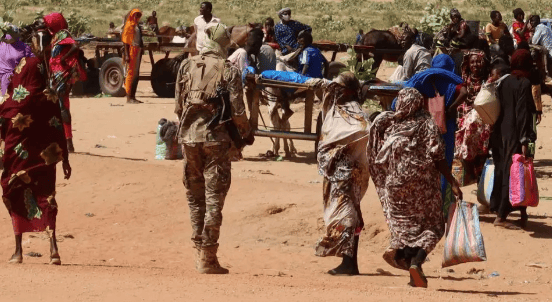As global attention flickers between crises, the United Nations has issued one of its starkest warnings yet: Sudan’s El Fasher has descended into “an even darker hell” after the Rapid Support Forces (RSF) seized control, triggering mass killings, targeted ethnic violence, and catastrophic civilian suffering.
In an emergency UN Security Council session, diplomats condemned the wave of atrocities sweeping the final major city in Darfur not under RSF control. The meeting — called by the UK — came amid credible reports of house-to-house executions, mass civilian casualties, and blocked escape routes.
‘No One Is Safe’: UN Details Grim Human Rights Violations
Martha Ama Akyaa Pobee, the UN’s Assistant Secretary-General for Africa, delivered a chilling account:
“The situation is simply horrifying … credible reports of mass killings and summary executions … no safe passage for civilians. Nobody is safe in El Fasher.”
According to Pobee, the UN Human Rights Office has verified widespread human rights violations, with communications in the city cut off, making it nearly impossible to determine the true death toll. Yet reports indicate families killed “in their beds” and civilians hunted down as they attempted to flee.
Weapons Flowing In — and Civilians Forced Out
Pobee underscored a critical concern fueling the crisis: the continued flow of weapons and foreign fighters into Sudan, intensifying a conflict already marked by starvation, sexual violence, and ethnic cleansing.
Tom Fletcher, UN Emergency Relief Coordinator, painted an equally bleak picture:
“El Fasher… has descended into an even darker hell.”
He revealed nearly 500 civilians slaughtered in a maternity hospital and tens of thousands fleeing toward Tawila, only to encounter extortion, kidnapping, and assault along the way — largely affecting women and children.
Security Council Condemns RSF — but Action Remains Limited
The UN Security Council issued a joint statement condemning:
Atrocities against civilians
Summary executions
Arbitrary detentions by RSF forces
Yet diplomatic pressure faces a geopolitical roadblock: the United Arab Emirates, widely accused of supplying arms and support to the RSF — allegations it continues to deny.
This session highlighted a growing dispute between moral urgency and international realpolitik — and it may be one reason concrete action remains elusive.
UK Parliament Responds — Arms Sales Under Scrutiny
In London, MP Stephen Doughty called reports from El Fasher “deeply alarming”. Pressure is mounting inside the UK government after evidence revealed British-made military equipment in Sudanese battle zones.
The government admitted UK-origin “items” were found — while insisting there is no proof British weapons or ammunition were used by the RSF. Critics say this careful language reveals growing unease.
Calum Miller, Liberal Democrat foreign affairs spokesperson, demanded a temporary ban on UK arms sales to the UAE until it can prove British equipment has not fueled atrocities.
U.S. Political Pressure Builds
Human Rights Watch urged sanctions against UAE leadership, and U.S. Senator Chris Van Hollen renewed calls to pass legislation blocking U.S. arms sales to the UAE over its suspected role in the conflict.
Despite denials from Abu Dhabi, global evidence continues to point toward external military support for the RSF — support many analysts say has emboldened the group’s advance through Darfur.
Calls for a ‘Coalition of Conscience’
Kate Ferguson of Protection Approaches issued an emotional plea:
“We need an emergency coalition of conscience … the world has failed to protect El Fasher from genocide.”
Her words echo growing frustration: nearly two years into Sudan’s civil war, international promises to protect civilians remain largely rhetorical.
Roadmap for Peace Exists — But Lies Dormant
A peace roadmap proposed by the Quad (U.S., UAE, Saudi Arabia, Egypt) last month — including a three-month truce, permanent ceasefire, and civilian-led transition — has not been enacted.
Until it is, Sudan’s humanitarian nightmare deepens daily, making El Fasher not only a battlefield but a symbol of global failure to prevent mass atrocities.
Why This Matters
Sudan risks sliding into full-scale genocide
Millions displaced, famine looming
Risk of regional spillover and extremist recruitment
Global arms accountability under spotlight
This conflict is not just a Sudanese tragedy — it is a test of the world's promise to prevent another Rwanda, another Srebrenica. So far, the world is failing.
key-takeaway
UN condemns mass killings in El Fasher by RSF forces.
Civilians trapped with no safe escape routes and cut communications.
Foreign arms fueling conflict, with UAE accused of aiding RSF (denies).
UK and U.S. pressured over arms links and calls for export bans.
Global response lagging, peace plan stalled, calls for urgent action.

